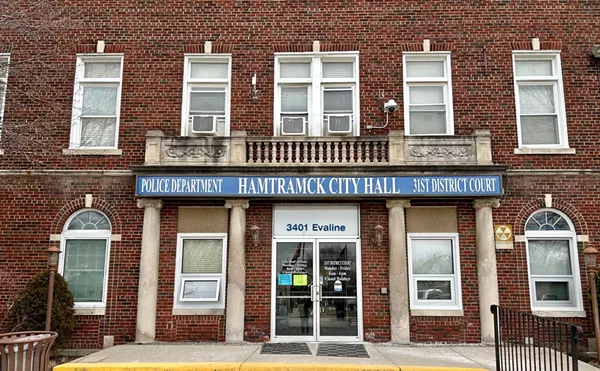
Audio By Carbonatix
[
{
"name": "GPT - Leaderboard - Inline - Content",
"component": "35519556",
"insertPoint": "5th",
"startingPoint": "3",
"requiredCountToDisplay": "3",
"maxInsertions": 100,
"adList": [
{
"adPreset": "LeaderboardInline"
}
]
}
]
Forget the complicated legal arguments, the assignment of blame, and Guantánamo's eventual place somewhere near the sickening bottom of the George W. Bush administration's abysmal history.
What really matters now regarding the Cuba-based U.S. detention center, according to a former military attorney who was part of the tribunals there, is simple: The American people could've prevented it and changed it.
"The mistake of Guantánamo is not what happened to 700 detainees, it's what we allowed to happen, what we allowed to continue and what we allow every day to continue," Stephen Abraham said in a lecture given at the Wayne State University Law School last week.
He knows firsthand what he's talking about. As lieutenant colonel with the U.S. Army Reserves, he served in Guantánamo with the Office for the Administrative Review of the Detention of Enemy Combatants as a tribunal member.
And what we've allowed by not speaking out, not contacting political leaders and not protesting, Abraham says, is the flagrant violation of legal principles that stretch further back than the Magna Carta.
"In Guantánamo, there were no peers. There was no comprehensive, credible evidence. There were no impartial decision makers," he said. "Who's responsible? I'm responsible. All of you are responsible, because the day after 9/11 you felt less secure and by a year later, you felt more secure. You were comfortable in your home knowing bad people were locked away and they didn't affect you. The problem is the same power exercised against them is the same power that could be exercised against you every day."
Organized by the International Law Students Association, Abraham's visit included an hour-long lecture with question-and-answer session, and an informal meeting with students and faculty.
It's not like Abraham is some knee-jerk bleeding heart. During the 1980s, the self-described Republican worked in counterterrorism in Germany after being commissioned as a second lieutenant in the U.S. Army Reserves. Following 9/11, he was mobilized as a lead terrorism analyst for the Joint Intelligence Center, Pacific, and went to Cuba for several months where he participated in hearings for the detainees.
(While writing this, News Hits is struck by the notion that we need some modern-day Woody Guthrie to stir our souls and raise our ire by rewriting the lyrics to "(Deportee) Plane Wreck at Los Gatos," with the kicker changed to "all they will call you will be deportees.")
Abraham was supposed to find exculpatory evidence for the detainees and present it at their tribunal hearings. But he found it impossible. "I was not provided the ability, the tools or the means otherwise to perform that function," he reported.
Since he left Cuba, he has been outspoken about the problems there and was the first officer to publicly criticize the operations of the Combatant Status Review Tribunals. He testified twice at the U.S. House of Representatives, once at the Foreign Affairs Committee and once with the Armed Services Committee.
He has watched as laws and polices related to the suspected terrorists held at Guantánamo were challenged in the court system. In June 2004, the U.S. Supreme Court ruled in Rasul v. Bush that detainees did have the right to challenge their indefinite detentions in U.S. courts. Lower courts had upheld the federal government's argument that detainees accused of being "terrorists" did not deserve court hearings and could be held indefinitely as "enemy combatants."
The Rasul ruling cleared the way for Guantánamo's habeas corpus hearings, which are proceedings to determine if detainees were being lawfully held.
But following the court's Rasul decision, Congress passed the Detainee Treatment Act of 2005 and the Military Commissions Act of 2006, which stripped classes of noncitizens of their rights to some court proceedings.
Michigan's entire congressional delegation — minus U.S. Rep. John Conyers (D-Detroit) — voted in favor of the Detainee Treatment Act, which purported to address inhumane treatment of prisoners but also legislatively tried to remove their rights to habeas hearings. The Military Commission Act — an attempt to limit detainees' access to judicial review — was opposed by Michigan Democrats in both houses — with the exception of Sen. Debbie Stabenow, who, you'll note, joined with Republicans in supporting it.
Shame on her.
After that legislation was enacted, the Guantánamo prisoners went back to court, again arguing for habeas hearings. In April 2007, the U.S. Supreme Court declined to hear the case, but two months later reversed that decision and decided to hear it. Oral arguments were in December; in July, the Supreme Court again granted detainees the right of habeas corpus in Boumediene v. Bush. Abraham's affidavit opposing the system was considered key to the successful arguments.
"For years the government enjoyed the presumption of accuracy, the presumption of the completeness of its argument, the presumption of the coherence of its arguments." Abraham said. "Now courts, I think, are taking a step back and saying, 'Is that really so?'"
What he saw in the Guantánamo hearings was a textbook case of an important legal principle. "Don't own the law," he said. "Don't own the facts. Own the presumptions. That's how you win the case.
"The presumption was the government's evidence was accurate, it was complete, it applied. As a result, what the government said was these individuals are unlawful enemy combatants unless you can prove otherwise."
Abraham hopes Americans will understand their own power to effect change. "Our government was created with the three branches of government in mind, but also with an element that outweighed all of them: the people. The people were the ones who were ultimately affected by these Supreme Court rulings."
News Hits is edited by Curt Guyette. Contact him at 313-202-8004 or NewsHits@metrotimes.com




